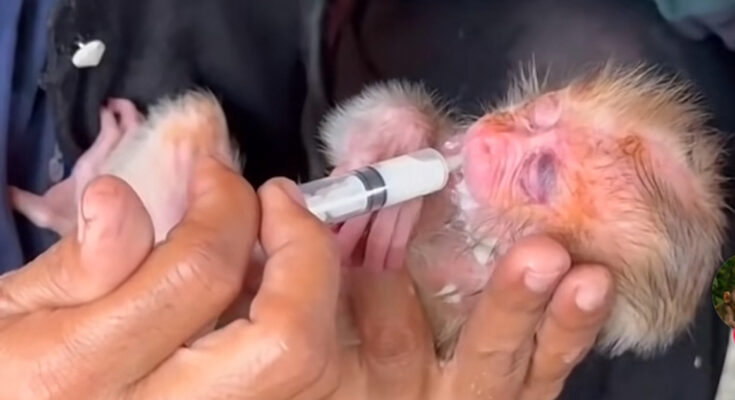In the heart of a lush, green forest far from human habitation, a tiny monkey lay quietly on a moss-covered rock. Its fur was damp, its eyes wide with confusion and fear. Just days earlier, it had been cradled in the warmth of its mother’s arms. But now, the little creature found itself completely alone, abandoned in a world that was beautiful but unforgiving.
The story of this poor little monkey is not just a sad tale of abandonment—it’s a powerful reminder of the delicate balance in the animal kingdom and the incredible will to survive, even in the face of unimaginable odds.
Abandoned in the Wild
The reasons for a mother monkey to abandon her infant can be complex. It may be due to illness, a lack of resources, or even instinctual behavior triggered by environmental stress. In this case, no one knows for sure what caused the separation. Perhaps the mother sensed weakness in her baby, or maybe a predator had startled the troop, scattering them and leaving the infant behind.
Regardless of the cause, the consequences were immediate. Alone in the dense forest, the little monkey faced hunger, exposure to the elements, and the constant threat of predators. Every rustle in the bushes could be danger. Every call in the canopy above could be a reminder of the family it lost.
A Struggle to Survive
Despite the odds, nature has a way of equipping even the smallest creatures with instinct. The baby monkey, though barely old enough to fend for itself, began to adapt. It sought shelter under tree roots during the night and learned to nibble on soft fruits and leaves during the day. Instinct guided its tiny hands, and desperation pushed it forward.
Miraculously, some forest animals—birds, insects, even a curious deer—seemed to accept its presence, or at least didn’t drive it away. This strange, silent form of companionship was perhaps what kept the monkey going. The forest, though harsh, wasn’t entirely heartless.
A Ray of Hope
One morning, while the monkey clung to a low branch, a team of wildlife researchers passed through the area. They were monitoring primate behavior and documenting forest ecosystems. One of them noticed the small figure alone in the trees and paused.
Realizing that the baby was abandoned, the researchers carefully approached. They understood the importance of not disrupting wild behavior, but also recognized that this infant had little chance of survival on its own.
The team transported the monkey to a nearby rehabilitation center where it received food, medical care, and—most importantly—safety. Over time, it began to trust again. Surrounded by other rescued primates, the little monkey started to regain the strength and social skills it would need to thrive.
Conclusion
The story of this poor little monkey, abandoned by its mother, is a tale of loss—but also one of resilience and compassion. In a world where nature can be both cruel and kind, sometimes a second chance comes from the most unexpected places.
Let this story remind us of the fragility of life in the wild—and our shared responsibility to protect it.



